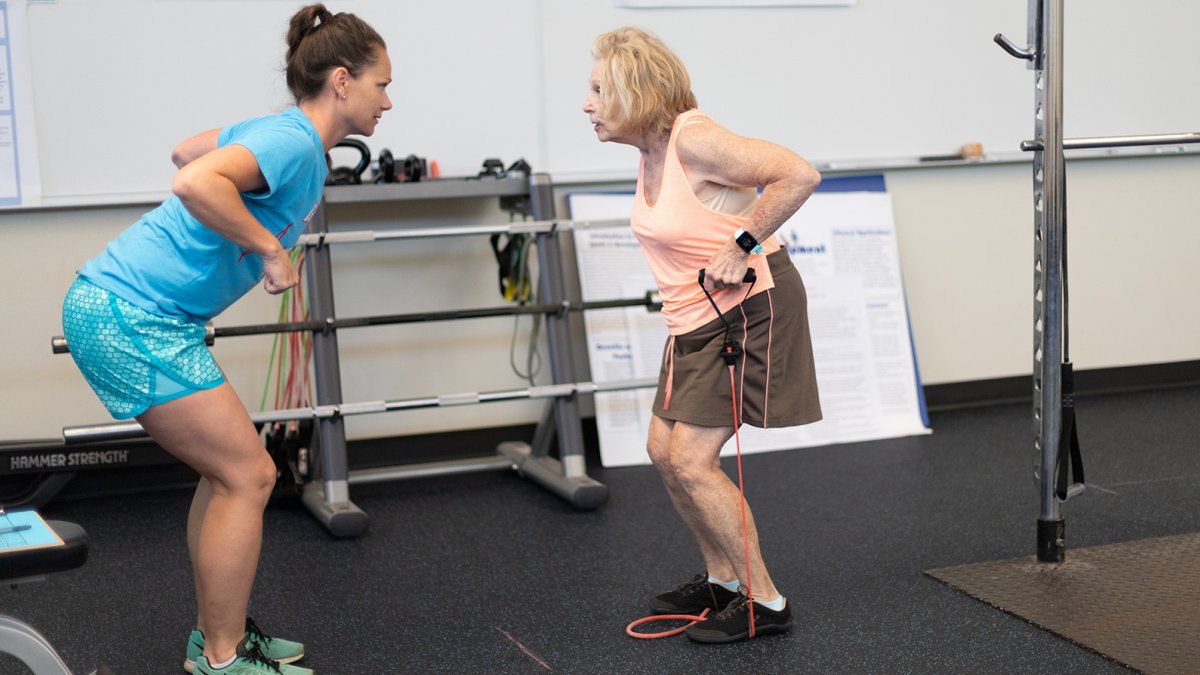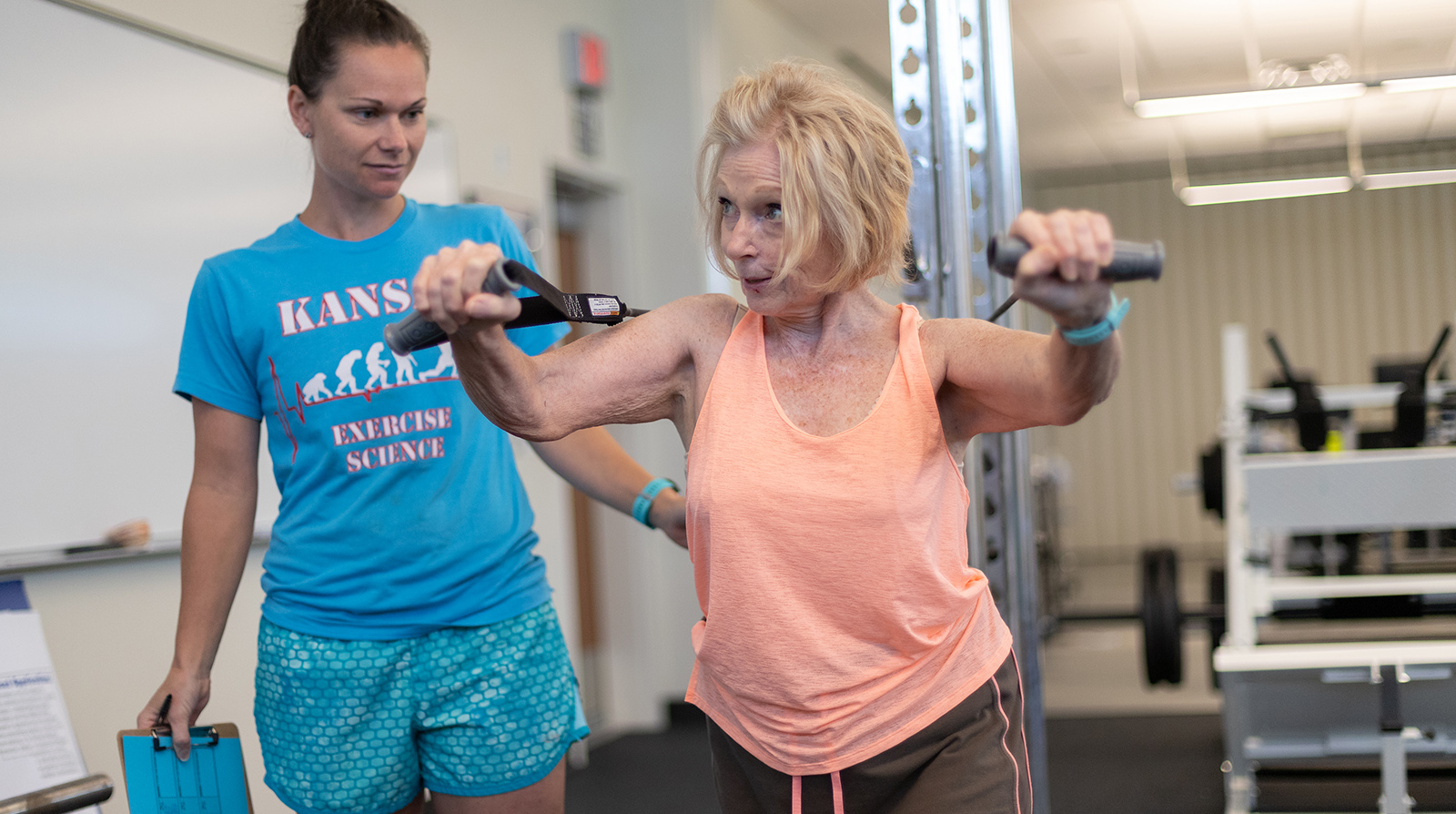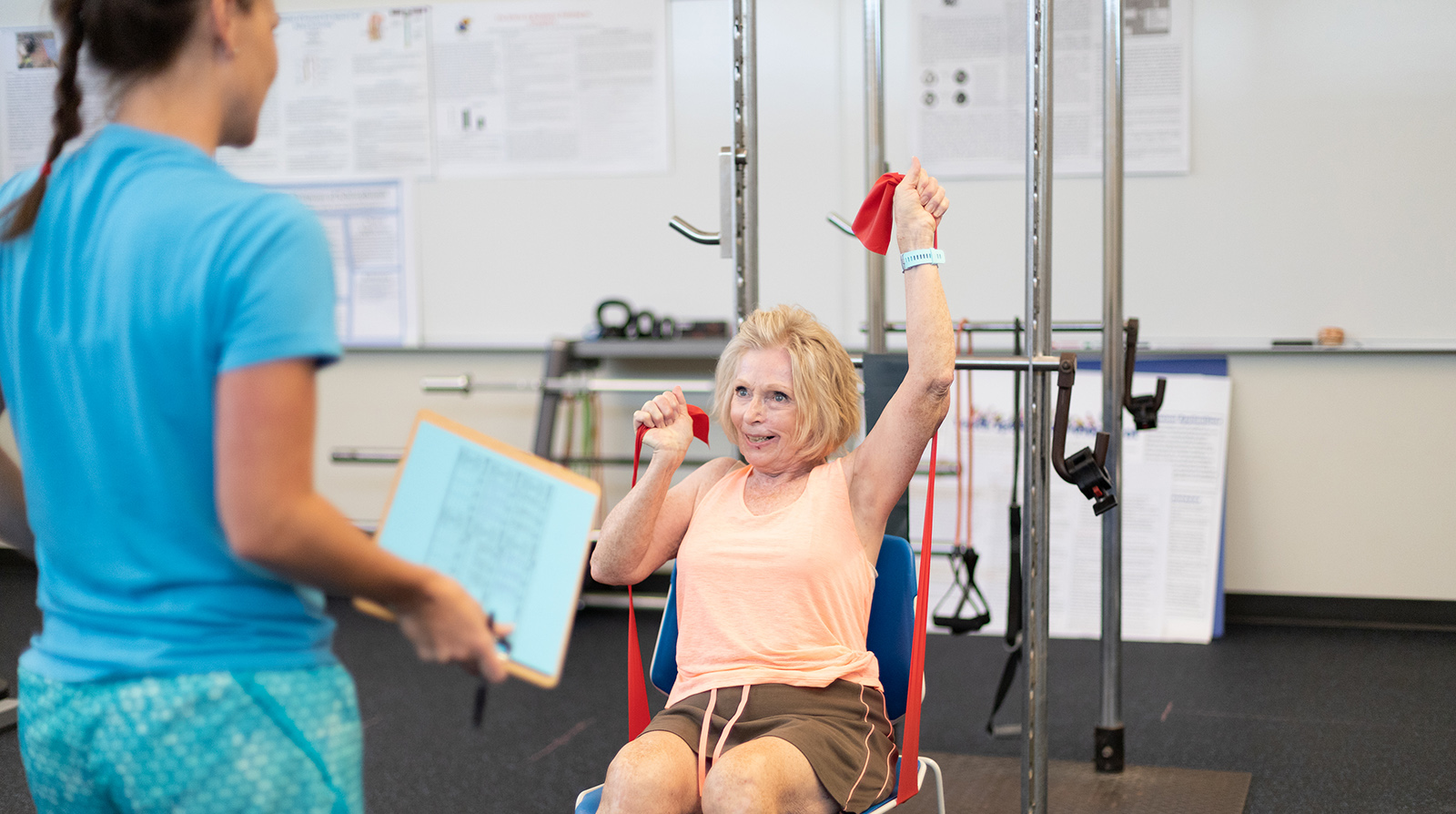Exercise science students research best mode of exercise for aging adults

Students in the exercise science undergraduate degree program at the KU Edwards Campus (KUEC) in Overland Park, Kansas, are working with volunteer members of KU’s Osher Lifelong Learning Institute program to conduct a clinical research study comparing the effectiveness of different modes of resistance training for maintaining muscle mass in older adults.
As an assistant professor in the Department of Health, Sport and Exercise Sciences, Ashley Herda is responsible for conducting research and publishing results that may benefit the public. She said one of her main areas of research interest is sarcopenia, which is a change in muscle mass and function as people age.
“After age 60 or 65, our muscle mass goes down and so does our function and as a result of that we typically see sacrifices in the ability to complete activities of daily living like being able to carry groceries or open heavy doors,” Herda explained. “So the purpose of this study is to identify whether or not training with elastic bands is just as beneficial as dumbbells. If it is, that would provide an accessible and relatively inexpensive means for people to engage in activity at home or on their own and not have to go somewhere and have a trainer.”
 Herda and her students developed three study groups:
Herda and her students developed three study groups:
- A control group whose individuals maintain normal activity.
- An elastic resistance training group who individually come to the KUEC exercise room two days a week for six weeks and have resistance training with elastic resistance bands.
- A weightlifting group who individually come to the KUEC exercise room two days a week for six weeks and have weight training with dumbbells.
When Herda realized her target subjects were the same demographic as the members of KU’s Osher Institute, she reached out to its director and asked if her request could be included in the next publication to members. The Osher Institute offers noncredit enrichment courses and events throughout northeastern Kansas and Greater Kansas City with a special focus for ages 50 and older.
One of the Osher members who volunteered to participate is 69-year-old Rose Reicherts of the Shawnee Mission area. She was attracted to the opportunity after reading about it in an Osher program email and said her background as a retired registered nurse in KU’s Cancer Center spurred her to get involved.
“Clinical trials are important because you find out how to improve — whether it's a medication, treatment plan, exercise plan,” she said. “You find out how to do things better by comparing control versus the proposed question.”
Herda said this clinical trial is not only great for participants, trials are beneficial for students and professors.
“If you're actively engaging in scientific research, then you're typically better capable of translating that information to our students so they can learn its practical application,” Herda said. “In the classroom, you can say, ‘We did this research project, this is what we found, therefore this is why we train people the way we do.’”
Herda says research projects like this one more effectively engage students in learning and give them a chance to publish their work for the benefit of the participants, the general public and further research.
“They learn the process, study research design,” she said. “It also gives them experience interacting with patients and using critical thinking skills to build on what they’ve learned.”
Mark Jakubauskas, KUEC’s new director for research and innovation, echoes the importance of research in training the students, as well as its benefits for the community.
“The KU Edwards Campus is uniquely positioned for faculty-led, student-involved and community-engaged research,” Jakubauskas said. “Our metro location provides close and ready proximity to community and educational partners, research subjects and student populations. Our faculty employ innovative, hands-on teaching practices and community-engaged research.”
Besides reaching out to Osher, Herda has printed and delivered fliers to area senior centers and retirement communities. She is still welcoming volunteers through spring break.
“There are some screenings we have to do to make sure volunteers qualify for the study,” Herda said. “Basically, this study targets men or women ages 55 to 85-years old. It really only excludes those who are undergoing active cancer treatment, who have had a hip or knee replacement, or who are already participating in structured exercise. They can’t be involved in a consistent exercise regimen like meeting with a trainer or going to a group fitness class four or more days a week. That would be too active. But if someone just walks around their neighborhood for 30 minutes with their dog every day, that’s not an issue.
Herda said once participants qualify, their body composition is measured in KUEC’s research lab using a dual-energy absorptiometry (DXA) and bioelectrical impedance analysis (BIA).
“The DXA is a full-body scan conducted using low-level X-ray technology to give us an image of the amount of body fat and total muscle you have,” Herda said. “The BIA uses an undetectable electrical current to provide comparable values. These machines measure how much muscle mass is in their total body weight and how much fat they hold on their person. ”
They will also measure participants’ upper and lower body strength and functional ability. Participants then train for six weeks before re-measuring to see results.
 Thanks to KU’s connection to Osher, Herda has a good start on her study but she still needs more participants.
Thanks to KU’s connection to Osher, Herda has a good start on her study but she still needs more participants.
“People who participate will not only be helping further the knowledge about why resistance training is important in aging, they’ll be learning more about themselves, their body composition, their strengths,” Herda said. “Often people don't know what their percent body fat is or how much muscle mass they have and what that means. And we interpret all of that for them try to make it individualized.”
According to Reicherts, participating in the study is easy and rewarding.
“They are very flexible with my schedule,” Reicherts said. “And I just think it's great to get insight on what you can do to improve your overall strength. I want to stay healthy. I would not be a happy person if I couldn’t do the things I like doing. I’ve got to be out and about!”
Photo Above: KUEC Exercise Science Assistant Professor Ashley Herda works with 69-year-old Osher Institute volunteer Rose Reicherts in a clinical trial to discover whether resistance bands or weights are more effective in developing muscle in older adults. Reicherts was randomly assigned to the group using resistance bands.
Learn more about the exercise science degree programs and strength and conditioning certificate from KU Edwards Campus, supported by Johnson County Education Research Triangle (JCERT).
About The University of Kansas Edwards Campus
The KU Edwards Campus at 127th Street and Quivira Road in Overland Park brings the high-quality academic, professional and continuing education programs as well as research and public-service benefits of KU to the Greater Kansas City community in order to serve the workforce, economic and community development needs of the region.
About KU’s Osher Lifelong Learning Institute
Part of KU Professional & Continuing Education, KU’s Osher Lifelong Learning Institute, with its network of more than 120 instructors, provides members with a wide range of noncredit enrichment courses, covering history, literature, art, music, religion and more without the pressure of exams or homework. The Institute delivers accessible, innovative learning environments to participants 50 years and older, at 29 sites in 16 cities across Kansas and Greater Kansas City.





